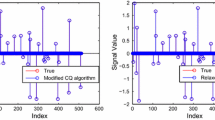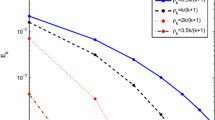Abstract
In this paper, we introduce a new self-adaptive CQ algorithm for solving split feasibility problems in real Hilbert spaces. The algorithm is designed, such that the stepsizes are directly computed at each iteration. We also consider the corresponding relaxed CQ algorithm for the proposed method. Under certain mild conditions, we establish weak convergence of the proposed algorithm as well as strong convergence of its hybrid-type variant. Finally, numerical examples illustrating the efficiency of our algorithm in solving the LASSO problem are presented.











Similar content being viewed by others
References
Alber, Ya.I., Iusem, A.N., Solodov, M.V.: On the projected subgradient method for nonsmooth convex optimization in a Hilbert space. Math. Program. 81, 23–35 (1998)
Ansari, Q.H., Rehan, A.: Split feasibility and fixed point problems. In: Ansari, Q.H. (ed.) Nonlinear Analysis: Approximation Theory, Optimization and Applications, pp. 281–322, Springer, New York (2014)
Aubin, J.P.: Optima and Equilibria: An Introduction to Nonlinear Analysis. Springer, News York (1993)
Byrne, C.: Iterative oblique projection onto convex sets and the split feasibility problem. Inverse Probl. 18, 441–453 (2002)
Byrne, C.: A unified treatment of some iterative algorithms in signal processing and image reconstruction. Inverse Probl. 20, 103–120 (2004)
Ceng, L.C., Ansari, Q.H., Yao, J.C.: An extragradient method for solving split feasibility and fixed point problems. Comput. Math. Appl. 64, 633–642 (2012)
Censor, Y., Elfving, T.: A multiprojection algorithm using Bregman projection in a product space. Numer. Algorithms 8, 221–239 (1994)
Censor, Y., Bortfeld, T., Martin, B., Trofimov, A.: A unified approach for inversion problems in intensity modulated radiation therapy. Phys. Med. Biol. 51, 2353–2365 (2003)
Censor, Y., Elfving, T., Kopf, N., Bortfeld, T.: The multiple-sets split feasibility problem and its applications for inverse problems. Inverse Probl. 21, 2071–2084 (2005)
Bello Cruz, J.Y., Iusem, A.N.: Convergence of direct methods for paramonotone variational inequalities. Comput. Optim. Appl. 46, 247–263 (2010)
Bello Cruz, J.Y., Iusem, A.N.: An explicit algorithm for monotone variational inequalities. Optimization 61, 855–871 (2012)
Dang, Y., Gao, Y.: The strong convergence of a KM-CQ-like algorithm for a split feasibility problem. Inverse Probl. 27, 015007 (2011)
Gibali, A.: Algorithm for solving the set-valued variational inequality problem in Euclidean space. Pac. J. Optim. 9, 61–75 (2013)
Goebel, K., Reich, S.: Uniform Convexity, Hyperbolic Geometry, and Nonexpansive Mappings. Marcel Dekker, New York (1984)
López, G., Martín-Márquez, V., Wang, F., Xu, H.K.: Solving the split feasibility problem without prior knowledge of matrix norms. Inverse Probl. 28, 085004 (2012)
Masad, E., Reich, S.: A note on the multiple-set split convex feasibility problem in Hilbert space. J. Nonlinear Convex Anal. 8, 367–371 (2007)
Qu, B., Xiu, N.: A note on the CQ algorithm for the split feasibility problem. Inverse Probl. 21, 1655–1665 (2005)
Solodov, M.V., Svaiter, B.F.: Forcing strong convergence of proximal point iterations in Hilbert space. Math. Progr. 87, 189–202 (2000)
Tan, K.K., Xu, H.K.: Approximating fixed points of nonexpansive mappings by the Ishikawa iteration process. J. Math. Anal. Appl. 178, 301–308 (1993)
Tibshirani, R.: Regression shrinkage and selection via the LASSO. J. R. Stat. Soc. Ser. B 58, 267–288 (1996)
Wang, F., Xu, H.K.: Cyclic algorithms for split feasibility problems in Hilbert spaces. Nonlinear Anal. 74, 4105–4111 (2011)
Wang, F.: Polyak’s gradient method for split feasibility problem constrained by level sets. Numer. Algorithm‘s 77, 925–938 (2018)
Wang, F.: A new method for split common fixed-point problem without priori knowledge of operator norms. J. Fixed Point Theory Appl. 19, 2427–2436 (2017)
Xu, H.K.: Iterative methods for the split feasibility problem in infinite-dimensional Hilbert spaces. Inverse Probl. 26, 105018 (2010)
Martinez-Yanes, C., Xu, H.K.: Strong convergence of the CQ method for fixed point iteration processes. Nonlinear Anal. 64, 2400–2411 (2006)
Yang, Q.: The relaxed CQ algorithm for solving the split feasibility problem. Inverse Probl. 20, 1261–1266 (2004)
Acknowledgements
The authors would like to thank the editor and the reviewers for their constructive suggestions and comments, which greatly improve the manuscript.
The second named author is funded by Vietnam National Foundation for Science and Technology Development (NAFOSTED) under Grant No.101.01-2017.08. His research is also partially supported by the Vietnam Institute for Advanced Study in Mathematics and by UTC under Grant T2018-CB-002.
Author information
Authors and Affiliations
Corresponding author
Rights and permissions
About this article
Cite this article
Anh, P.K., Vinh, N.T. & Dung, V.T. A new self-adaptive CQ algorithm with an application to the LASSO problem. J. Fixed Point Theory Appl. 20, 142 (2018). https://doi.org/10.1007/s11784-018-0620-8
Published:
DOI: https://doi.org/10.1007/s11784-018-0620-8
Keywords
- Split feasibility problem
- variational inequality
- fixed point problem
- monotone operator
- weak convergence
- strong convergence




